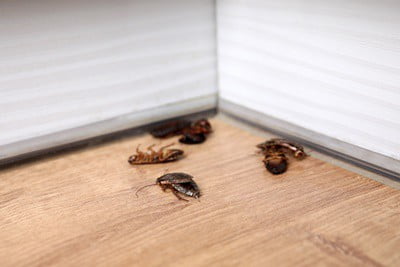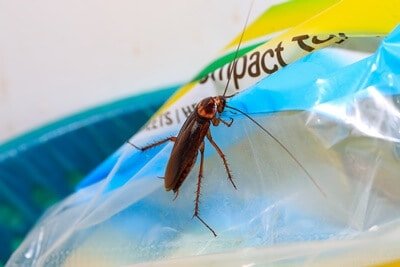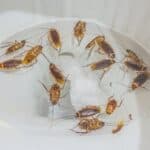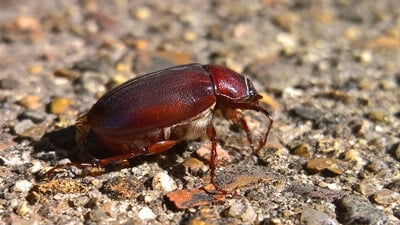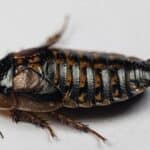Cockroaches are known to be among the hardiest creatures on Earth. Many studies focus on their survivability, which is impressive by any standard in the animal kingdom. They can even adapt to modern pesticides, but cockroaches are vulnerable to high temperatures.
Cockroaches die when exposed to temperatures above 120 degrees Fahrenheit. Their hard exoskeleton is designed to protect them, but it will be compromised ever quicker at higher temperatures. Cockroaches are poikilothermic, so they are forced to absorb high heat, which will kill them.
You can use heat from your dryer to speed up the impact of cockroach bait. Even exposing cockroaches to temperatures outside their preferred range can shorten their lifespans.
Are Cockroaches Heat Resistant?
Cockroaches are not heat resistant. In fact, they require their environment to be in a specific temperature range to thrive. That’s because they are cold-blooded insects that draw heat from their living environment. Unlike warm-blooded creatures, cockroaches are unable to regulate their own body temperature.
Even still, cockroaches can withstand heat better than humans. Most species that infest homes originate from hot climates, such as the Middle East and Africa. Their bodies are designed to withstand a certain amount of heat, with an ideal range of 70-90 degrees Fahrenheit. Even if temperatures climb up to 110 degrees, they will be OK.
This is made possible due to their exoskeleton. Cockroaches have a hard exterior that protects their organs and muscles from external harm. That includes environmental factors such as fluctuating temperatures.
Cockroaches use this shell to absorb moisture from the air and breathe. However, it can also protect them. While a human can be harmed by sunburn, a cockroach can’t. It can hold its breath to prevent hot air from drying out its organs for a while. The design of its shell also keeps cockroaches from losing moisture in harsh conditions.
Eventually, cockroaches will succumb to extreme heat. They’re not completely heat resistant and can die from temperature spikes.
Why Do Roaches Die From Heat?
Cold-blooded creatures are unable to control their body temperature because they lack brown fat. This is the kind of fat that warm-blooded animals directly convert into heat. Instead, ectothermic animals regulate their body temperature through external means. This includes:
- Bathing in the sun
- Moving to warmer places
This enables cockroaches to devote energy to things other than generating heat, such as:
- Foraging
- Reproducing
- Conserving fat
That explains why cockroaches have such a prolific reproduction cycle. It also enables them to go long periods (up to 1 month) without eating. It does come at a cost, though. Cockroaches are vulnerable when the temperatures around them change.
If mammals are at risk of overheating, they can lower their body temperature. This is made possible through certain metabolic functions, such as sweating and salivating. It allows mammals to survive in less-than-ideal environments. They need the energy to keep those metabolic functions active.
However, cold-blooded insects like cockroaches have no way of cooling off. If they are at risk of overheating, their only option is to flee the area. If the climate itself is hot, or you’ve trapped a cockroach in a hot car, that becomes impossible. Even if there’s a large amount of food and water at their disposal, they’ll still die.
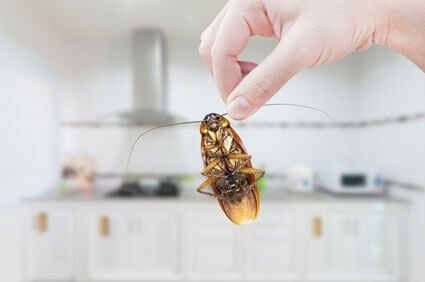
At What Temperature Will Cockroaches Die?
Cockroaches are in danger of fatal heat exposure at 120 degrees Fahrenheit. At this temperature, the cockroaches will die in 2 to 7 hours. This gives them time to vacate the area. If a cockroach is sick or injured, it will succumb to the heat more quickly. The hotter this temperature gets, the less time it takes for cockroaches to die.
Once the temperatures climb up to 130 degrees Fahrenheit, cockroaches will have less time to survive. According to the Journal of Insect Physiology, a cockroach’s nervous system reacts directly to temperature. If the surroundings become cold, it can activate a type of coma that allows it to weather the change for several days. However, cockroaches possess no such defense against hot temperatures.
Instead, a cockroach will find its exoskeleton turning against it at 120 degrees Fahrenheit. The thick keratin shell will no longer insulate its organs. The heat will penetrate and begin drying out its vital organs. The cockroach will dry out, lose its ability to breathe, and die within 1 hour.
Do Roaches Get Weaker In The Heat?
Even if a cockroach manages to escape before the heat intensity becomes lethal, it will be affected long-term. According to the University of Minnesota, a female cockroach will not transmit fat-body intracellular symbiotes to her eggs. Exposure to heat treatment removes this ability. This leaves the next generation weaker, lacking an important collection of microorganisms that make cockroaches so durable.
Interestingly enough, that doesn’t impact all of a cockroach’s microorganisms. According to The Society for Applied Microbiology, the gut bacteria of the Madagascar and Dubia cockroaches could withstand temperatures of 95 degrees Celsius. While that won’t kill cockroaches that contain those microorganisms, it proves that they are durable even at a microscopic level.
In the macro sense, cockroaches live shorter lifespans if consistently exposed to temperatures above their ideal range. This will not kill them immediately, but it may shave weeks off their life expectancy. Here is the preferred range for the most common household cockroaches:
| Type of Cockroach | Preferred Temperature |
|---|---|
| American Cockroach | 68 to 84 °F |
| German Cockroach | 59 to 95 °F |
| Oriental Cockroach | 68 to 86 °F |
Even the American cockroach will be able to handle temperatures of 100 degrees Fahrenheit. It may grow, lay eggs, and infest homes. However, a female living up to 2 years may only survive for 6-12 months.
Nonetheless, that’s enough to keep the species alive. Cockroaches have been around for more than 300 million years. That means they were present when the Earth was at its hottest, such as during the Cretaceous period.
Killing Roaches with Heat
If you’re concerned about using toxic chemicals, then cockroaches can be killed with heat. Depending on your situation, it can be an effective pest control method for your home. With that said, you should proceed with caution. Cockroaches are more tolerant of heat than
- Humans
- Certain household items
- Electronic parts and components
Professional Heat Treatment for Cockroaches
Exterminators sometimes offer heat treatment services to kill off cockroaches. This works well against adult cockroaches, nymphs, and eggs. The treatment will involve:
- Targeting one area of the home at a time
- Removing items that could be damaged
- Sealing the area to insulate rooms and prevent cockroaches from escaping
- Raising the temperature in a controlled way with fans, pipes, and boilers
Thermometers and infrared cameras are used to detect cold zones in a room. In response, the fans are directed to blow hot air towards those areas. This ensures there isn’t a single spot where cockroaches can hide.
While this can be effective, it isn’t suitable for every home infestation. For example, some homes cannot withstand high temperature ranges. You could dry out the plaster in your walls and cause fissures to develop. It’s unwise to use house-wide heat treatment against cockroaches by yourself. A lack of experience or incorrect tools may result in:
- Cold spots being left behind, allowing cockroaches to evade the treatment
- Temperatures not being raised to the correct range
- Damage caused to your home, furniture, and electronics
- Injury or harm to yourself or others
DIY Heat Treatment for Cockroaches
For home purposes, the best way to use heat is to drive roaches out. If you place a space heater near a suspected nest, the cockroaches will be compelled to migrate to other parts of the house.
As cockroaches leave to cool off, they may be driven into roach traps, bait motels, and pesticide measures. This can make traditional pest management more effective.
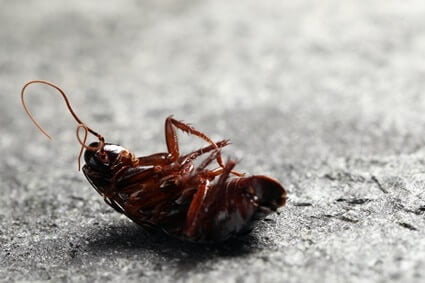
Temperature To Kill Cockroaches
If you want to use heat treatment against roaches, there are situations where it’s safe. If your climate normally reaches temperatures above 100 degrees Fahrenheit, use this to your advantage. This allows you to treat cockroaches in your:
As discussed, roaches will die when exposed to temperatures over 120 degrees Fahrenheit. If these areas are well-insulated and exposed to outside heat, they may achieve that range naturally. You need only increase the heat by turning off any fans or coolers. If it’s well insulated, open the doors so hot air can get in.
To remove cockroaches from your car, remove all items that may be damaged by heat. Place it in the sun, but cover the windows so that light does not directly bake into your dashboard. This may harm the plastic, as well as sun-fade other parts of your interior. Allow it to sit in the sun for the entire day or several days if you’re able. To be extra sure, place a thermometer inside the car, so you can check when it’s reached the correct temperature.
You can increase the heat in all areas with space heaters. These are fans that blow out hot air and raise the temperature of a room. However, while many portable space heaters can go up to 150 degrees Fahrenheit, you shouldn’t leave them on for several hours at this temperature. Doing so may be a safety hazard.
Does Dryer Heat Kill Roaches?
The heat settings on an average dryer will vary between 120-135 degrees Fahrenheit. However, some brands possess a higher range that’s capable of attaining 176 degrees Fahrenheit. Because of this, cockroaches will die in your dryer. If you have clothing infested by roaches, this is a way to kill them.
Cockroaches die in heat. Even cockroaches can’t tolerate high ranges indefinitely. When the temperature exceeds 120 degrees Fahrenheit, cockroaches will die off within hours.
